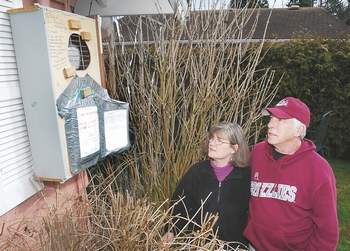
Keith Thorpe/Peninsula Daily News
Peninsula Daily News: A resident says the city has warned that her electrical power could be shut off if a wooden box she and her husband fastened over their electric meter to prevent the installation of a new wireless “smart” meter is not removed.
“I feel threatened. I feel harassed. I also feel afraid of what the city is going to do with us,” Virginia Leinart told City Council members at Tuesday’s meeting.
Leinart — who has lived in Port Angeles (WA) with her husband, Tom, since 1980 — said the couple returned from a trip last week to find a letter from Rick Hostetler, city customer service manager, saying the box, built from an old wooden drawer, must be removed.
“The city requests that you immediately remove the obstruction for access to your electric meter to ensure the safety of our staff as well as maintaining the electrical integrity of your home,” Hostetler wrote in the Feb. 27 letter.
The letter did not say the Leinarts’ electrical power would be shut off, though Virginia Leinart said Hostetler told her over the phone Tuesday that service could be stopped in 10 to 15 days if the box is not removed. “This wasn’t a threat to install a smart meter right away,” Leinart said in later interview.
Craig Fulton, city public works and utilities director, said shutting down power won’t be considered until after a city electrical inspector meets with the Leinarts, perhaps as early as this week.
He said one other household has erected a barrier to its meter and has been sent a letter. He did not want to reveal the names of the residents until city officials have spoken with them, he said.
Leinart said she and her husband screwed the box to the wall last June to prevent the city from replacing her analog meter with a digital smart meter that can be read wirelessly from City Hall. A hole covered by a baker’s cooling rack allows the meter to be seen but not touched.
Fulton said the box was brought to Hostetler’s attention in December.
Leinart is one of 49 residents who have asked the city to refrain from installing new smart meters on their homes, Fulton said.
City staff will contact people on this list before any smart meter is installed, Fulton said. “There is no reason to block their meter for any reason,” he said.
Leinart and others say the meters violate their right to privacy and pose dangers to human health through the wireless signals they use to transmit data. Between 60 and 70 people attended a September council meeting in opposition to the project.
City officials maintain the meters will collect only utility usage data to be sent to City Hall and pose no greater risk to human health through their wireless signals than cellphones.
City code requires that utility staff have “free and safe” access to meters in the event they need to be accessed quickly during an emergency, Fulton said, adding that cutting off service is always the last option.
The access requirements are also for the safety of city staff, Fulton added. “Upon request, the customer shall correct any condition that limits or restricts free and safe access to or operation of the Department’s meters or service,” city code states.
“Failure of the customer to comply within a reasonable time specified, as determined by the Director, shall subject the customer to disconnection of service.”
Fulton said a city electrical inspector will meet with the Leinarts about what can be done to make sure they’re compliant with city code, adding that staff would give the Leinarts at least 15 days to comply and not shut power off immediately. “They [would] have plenty of notice,” Fulton said. “No clock has started.”
Leinart said she plans to decide in the coming days what she’ll do with the box covering her electric meter. “I just hope this is resolved in a happy way,” Leinart said.
“I like working with the city, and I think they’re trying to work this out.”
Under a $4.9 million contract with Atlanta-based Mueller Systems, 2,080 smart electricity meters and 1,200 smart water meters have been installed on residences and businesses. All are still being read manually. A flurry of software problems have delayed full installation by at least a year and a half.
A report presented in February by West Monroe Partners, a city consultant hired to evaluate the stalled smart meter program, detailed significant changes Mueller will need to make to complete the project per city specifications, saying the company’s shortcomings had placed the smart meter project in “imminent failure.”
Tests of batches of the 2,080 smart electricity meters and 1,200 smart water meters installed on houses and businesses have failed to consistently send accurate usage data from the meters to city servers, the report said.
In January, the city declared Mueller in breach of contract for failing to meet “crucial benchmarks” for the project.
Fulton said Mueller has responded to the city’s breach-of-contract notice. City staff members are reviewing the response and are expected to brief council members on it at a council meeting later this month or in April. “There’s a lot of internal analysis we need to do first,” Fulton said.
Both the Clallam County Public Utility District — which serves all areas in the county, including Sequim and Forks, that are outside Port Angeles — and the Jefferson County PUD have electricity meters that can be read via radio signals, but they cannot receive information from public utility staff and so aren’t smart meters.
See also:
- Illinois women arrested for blocking Smart Meter installers
- Woman opts out of Smart Meter, has electricity disconnected by armed men
- Smart Meters – More Bad Stuff Confirmed
- Agenda 21: Smart Meters – What’s the Big Deal?
DCG

